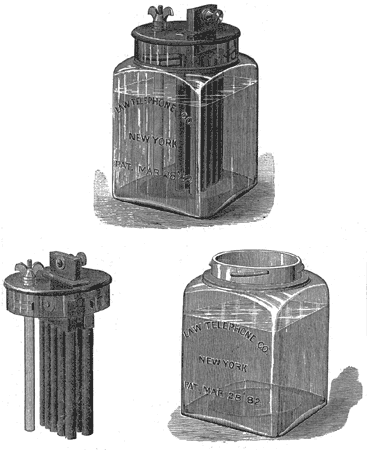[Trade Journal]
Publication: Electrical Review
New York, NY, United States
vol. 5, no. 14, p. 3, col. 1-2
The New "Law Prism" Battery.
AN INGENIOUS IMPROVEMENT OF THE "LAW OPEN-CIRCUIT BATTERY" BY WHICH ECONOMY AND EFFICIENCY ARE HAPPILY COMBINED.
If everybody was rich and costliness did not frighten the general consumer, then each one would hasten to supply himself with whatever contributed to his convenience or served to lighten or shorten his labors. But unhappily the general public are poor, and no matter how convenient a contrivance is, the many, if it be expensive, must deprive themselves of it, and its projectors cannot hope to dispose of it save to the few who are possessed of a superabundant supply of means. This is readily seen in the multitude of ingenious but costly articles that flood the market, and for which there is only a limited demand and a restricted sale. Exhaustive treatises explaining their merits and advantages are, from time to time, printed and distributed, but the general public though not denying their truth, show an absolute indifference to their existence for the very good reason that they cannot afford to purchase them.
The primary battery has for years been looked upon as in many ways an inestimable boon, but altogether too expensive for general domestic purposes, and it is, therefore, with not a little pleasure we illustrate and describe to the readers of the New York ELECTRICAL REVIEW, the new "Law Prism" battery which is made by the Law Telephone Company of this city, and supplied to the general public at a cost, considering its efficiency, ludicrously low. It is designed for use for the thousand and one things to which electricity is now applied. Some of the most important of these usages are in connection with telephony, gas lighting, burglar alarms, electric clocks, annunciators, electric bells and medical apparatus. Indeed, it will be found of unusual efficiency with everything requiring the presence of an open circuit battery. It is efficient and simple, inexhaustible and indestructible. The new design of screwing on the top which is readily accomplished by a one-half turn cannot fail to commend itself and be appreciated by the telephone people.
Messrs. Childs and Shaw have show great ingenuity and skill in the construction of the cover and its mode of fastening.
The price of the battery complete is only $1.50, and this and the fact that it does not require sealing and unsealing has created a large demand for it among those who heretofore have not been in the market as purchasers.
The positive pole of the "Law" battery becomes neither consumed nor exhausted. This is not, like the "guarantees" of the general shop-keeper, an empty promise to be evaded upon occasion. On the contrary, we have authority for saying that the projectors and manufacturers of the "Law" battery will replace, without charge, each and every exhausted positive pole returned to them, and will pay all the costs of transportation of the same. The importance of this assurance will, without doubt, be appreciated by those who use such batteries and who are, therefore, aware how expensive they have found the constant renewal of positive poles.
The "Law" battery has no brass and iron screws so apt to corrode, no manganese or chlorine are contained in prism or porous cup, no numerous and heavy carbons to easily get loose or break the lid.
For this and other reasons all main or branch lines of telephone, if they do not soon use this battery would find it to their advantage to give it a trial as a transmitter battery. It is uniform of action, and whether it be new or old, remains constant, only requiring that the zinc or solution be renewed at proper intervals, just as a clock, to keep good time, requires to be wound up at times. It is this faculty of serving without deteriorating or lessening of powers that serves to make this battery so invaluable where open circuit batteries are required, and for this, if for no other reasons, the "Law" battery is gradually becoming popular for gas lighting, burglar alarms, call bells, annunciators, clocks and the like. How many batteries have been discarded because of the continual attention they required!
 |
| The New "Law Prism" Battery. (Size Over All 4½ X 4½ X 7½) |
If batteries which at first threw a good spark gradually deteriorate, it leads to the supposition — a supposition which gradually becomes a reality — that they will fail at the very moment when they are most needed; and as a result, especially where public halls are to be lighted, their parts must be cleansed or renewed. This is at once a nuisance and an expense, and many have heretofore deprived themselves of the advantages of electric gas lighting to save themselves this.
It is the same in the service of dwelling-houses — an immense field for the open circuit battery. Better the old style of bell pulls and even knockers, than that the bell should, without any warning, give out and refuse to answer the press of the button until the company have been notified.
The jovial burglar, too, if he is in luck, and comes when the battery is "out of order," may wantonly open windows and doors and "burgle" to his heart's content for the warning voice of the "alarm" will be stilled, and it were as easy to send for a policeman as for a man to attend to the battery.
By the use of the new "Law" battery all these and other evils may be avoided, for, as said before, it neither deteriorates nor "gives out," and may, therefore, be justly set down as efficient and reliable.
